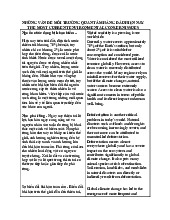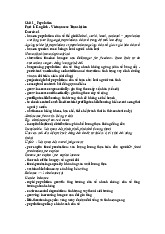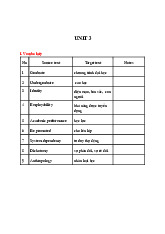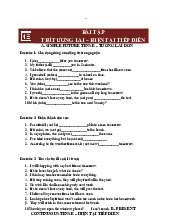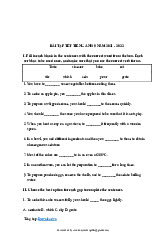






Preview text:
7.7 .22 ( Homework) PRACTICE TEST A. LISTENING
I. Listen to five short conversations and choose the correct answer. (5 pts)
1. Where will the girl meet? (Pet 2 – test 1) A. In the park B. By the entrance C. At the ice-cream
5. Sarah’s mother is ________. A. doing the washing B. doing the washing-up C. washing her face
2. What will Chris get for his birthday? (Pet 2 – test 2) A. CDs B. a shirt C. a book on sport
4. Which building was hit by lighting? (Pet 2 – test 3) A. A factory B. A hotel C. An apartment
3. What did she bring? (Pet 2 – Test 4) A. soap, towel, toothbrush
B. soap, toothpaste, toothbrush C. towel, toothpaste, soap
II. You will hear a boy asking for information about a plant. Listen and complete questions 1-5.
You will hear the conversation twice. (5 pts) Plant for Mum Name of plant: Sweet William Colour of flowers: 1. ……………………. Season to see flowers: 2. ……………………. Month to put plant outside: 3. ……………………. Final size of plant:
4. ……………….. cm tall Price of plant today: 5. ……………………. £
III. You will hear a man called Stephen Mills talking to a group of people about a trip to India to see tigers. (5 p THE TIGER TOUR Stephen’s profession: (1)………………….. Date of departure: (2)………………….. Number of tourists in group: (3)………………….. Type of accommodation: (4)…………………..
Means of transport in the park: Open truck in the north
(5) …………………. in the south 1
IV. You will hear Sarah Brown talking about her work as a television weather forecaster. Choose
the correct answer. (5 pts)
1. How long has Sarah worked as a weather forecaster? A. two years B. seven years C. twenty years D. thirty years
2. What does Sarah say about her job?
A. She sometimes has to work at night
B. She enjoys getting up early
C. She works ten or twelve hours a day
D. She sometimes has to get up early 3. Sarah’s husband ________.
A. works on the same days each week
B. wants to move nearer his work.
C. spends a lot of time traveling.
D. doesn’t have as much time at home as Sarah
4. Sarah is pleased because she ________.
A. has got her pilot’s licence.
B. taught her husband to play tennis C. took part in a long race.
D. She always wins when she plays tennis.
5. A man in India wanted ________. A. to meet Sarah’s family B. a photo of Sarah
C. to receive a letter from Sarah. D. to marry Sarah.
B. PHONETICS- GRAMMAR- VOCABULARY- LANGUAGE FUNCTION
I. Choose the answer A, B, C or D which best fits the space in the following sentences. (10 points)
1. Several cars, …………. owners had parked them under the trees, were damaged. A. their B. of which C. whom D. whose
2. Can you tell me who is responsible …………. passports? A. for checking B. checking C. about checking D. to check
3. My brother is intelligent but he……………..common sense. A. fails B. lacks C. misses D. wants
4. But for his help, I……………. A. could not have succeeded B. had not succeeded C. did not succeed D. would succeed
5. Not only ……………. to speak to him, but she also vowed never to see him again.
A. she refused B. did she refuse C. she did refuse D. when she refused
6. Peter: “I’ve been awarded a scholarship to study in America.”
Kate: “Uh, really? __________! 2 A. Take care of yourself B. Congratulations C. You are always lucky D. Lucky as you are
7. "Oop! I'm sorry for stepping on your foot." - "__________." A. You don't mind B. You're welcome C. That's fine D. Never mind
8. George: “In my opinion, action films are exciting.” Frankie: “______” A. Yes. Congratulations!
B. There’s no doubt about it. C. What an opinion!
D. You shouldn’t have said that.
9. George: “_____________.”
“Thank you for your compliment.” Michelle: A. You’ve done your work B. This is a present for you
C. I’m glad that you’re well again
D. You look pretty in this dress
10. Jack: “Mary, remember to send my regards to your grandfather.”
Mary: “----------------------__”
A. You’re welcome. B. Thanks, I will. C. That’s a good idea. D. It’s my pleasure.
II. Give the correct form of the words in brackets (5 points).
1. He is full of ……………………...for his English teacher. (ADMIRE)
2. If it doesn’t rain soon, there’ll be a great…………….…….. of water. (SHORT)
3. My father can repair electric ………………...very well. (APPLY)
4. Most of the area has been ……………………….. (ELECTRIC)
5. John ___________ refused our suggestion. (DECIDE)
III. Choose the underlined words or phrases in each sentence below that needs correcting. (5 points)
1. The latest news of the earthquake survivors are very disturbing A B C D
2. Because there are less members present tonight than there were last night, we must wait until the A B C next meeting to vote. D
3. The salad tasted so well that my brother returned to the salad bar for another helping. A B C D
4. A dolphin, often called a “porpoise,” is considered to be one of the bright among animals. A B C D
5. The Greens have two sons, neither of them lives with them. A B C D C. READING
I. What does each text say? Choose the correct explanation A, B, or C. (5 pts) 3
II. Choose the word or phrase which best completes each blank in the following passage (10 pts).
Plants grow in almost (1)______ part of the world. We see (2)______ plants as flowers, grass, and
trees nearly every day. Plants grow high on mountain-tops, far in the oceans, and in many deserts and (3) ______ regions. 4
Without plants, there could be no life on earth. Man could not live without air or food, and so he
couldn’t live without plants. The oxygen in the air we breathe comes from plants. The food we eat also
comes from plants or from animals that eat plants. We build houses and make many useful (4)______
from lumber cut from trees. Much of our clothing is made (5)______ the fibers of the cotton plant.
Scientists believe there are more than 350000 species of plants, but no one knows for (6)______.
Some of the smallest plants, called diatoms, can be seen only with a (7) ______. A drop of water may
hold as many as 500 diatoms. The largest living things are the giant sequoia trees of California. Some
of them stand more than 290 feet high and measure over 30 feet wide
Scientists (8)______ all living things into two main groups – plants and animals. It is usually easy to
tell the two (9)______. Almost all kinds of plants stay in one place, but nearly all species of animals
move about under their own power. Most plants make their own food from air, sunlight, and water.
Animals cannot make their own food. The basic units of all life, called cells, are also different in plants
and animals. Most plants have thick walls that (10)______ a material called cellulose. Animal cells do not have this material. 1. A. all B. each C. every D. total 2. A. these B. those C. all D. such 3. A. polar B. polarized C. poled D. pole 4. A. products B. activities C. games D. plays 5. A. in B. up C. by D. from 6. A. certainty B. guarantee C. sure D. certainly 7. A. telescope B. periscope C. stethoscope D. microscope 8. A. part B. separate C. divide D. sort 9. A. difference B. apart C. distinctly D. separately 10. A. contain B. maintain C. stock D. incorporate
III. (10pts) Read the passage below and choose the best answer from A, B, C, or D.
Millions of people are using cell phones today. In many places, it is actually considered unusual
not to use one. In many countries, cell phones are very popular with young people. They find that the
phones are more than a means of
communication - having a mobile phone shows that they are cool and connected.
The explosion in mobile phone use around the world has made some health professionals worried.
Some doctors are concerned that in the future many people may suffer health problems from the use of
mobile phones. In England, there has been a serious debate about this issue. Mobile phone companies
are worried about the negative publicity of
such ideas. They say that there is no proof that mobile
phones are bad for your health.
On the other hand, medical studies have shown changes in the brain cells of some people who
use mobile phones. Signs of change in the tissues of the brain and head can be detected with modern
scanning equipment. In one case, a traveling salesman had to retire at young age because of serious
memory loss. He couldn't remember even simple tasks. He would often forget the name of his own
son. This man used to talk on his mobile phone for about six hours a day, every day of his working
week, for a couple of years. His family doctor blamed his mobile phone use, but his employer's doctor didn't agree.
What is it that makes mobile phones potentially harmful?
The answer is radiation. High-tech
machines can detect very small amounts of radiation from mobile phones. Mobile phone companies
agree that there is some radiation, but they say the amount is too small to worry about. 5
As the discussion about their safety continues, it appears that it's best to use mobile phones less
often. Use your regular phone if you want to talk for a long time. Use your mobile phone only when
you really need it. Mobile phones can be very useful and convenient, especially in emergencies. In the
future, mobile phones may have a warning label that says they are bad for your health. So for now, it's
wise not to use your mobile phone too often
Question 55: According to the passage, cell phones are especially popular with young people because __________ .
A. they make them look more stylish.
B. they keep the users alert all the time.
C. they cannot be replaced by regular phones.
D. they are indispensable in everyday communications. Question 56: The word "
in the passage most closely means ________ . means" A. meanings B. expression C. transmission D. method
Question 57: Doctors have tentatively concluded that cell phones may _________ .
A. cause some mental malfunction
B. change their users’ temperament.
C. change their users’ social behaviours.
D. damage their users’ emotions.
Question 58: "Negative publicity" in the passage most likely means _________ .
A. widespread opinion about bad effects of cell phones.
B. information on the lethal effects of cell phones.
C. the negative public use of cell phones.
D. poor ideas about the effects of cell phones.
Question 59: The changes possibly caused by the cell phones are mainly concerned with ______ .
A. the smallest units of the brain.
B. the mobility of the mind and the body. C. the resident memory. D. the arteries of the brain.
Question 60: The man mentioned in the passage, who used his cell phone too often, ________ . A. had a problem with memory. B. abandoned his family.
C. suffered serious loss of mental ability.
D. could no longer think lucidly.
Question 61: The word "potentially" in the passage most closely means _________ . A. certainly B. obviously C. privately D. possibly
Question 62: According to the passage, what makes mobile phones potentially harmful is ________ . A. their radiant light. B. their raiding power. C. their power of attraction. D. their invisible rays.
Question 63: According to the writer, people should __________ .
A. keep off mobile phones regularly.
B. never use mobile phones in all cases.
C. only use mobile phones in medical emergencies.
D. only use mobile phones in urgent cases.
Question 64: The most suitable title for the passage could be __________ .
A. Technological Innovations and Their Price. B. The Way Mobile Phones Work.
C. The Reasons Why Mobile Phones Are Popular.
D. Mobile Phones: A Must of Our Time
IV. Read the passage carefully, then decide whether the following statements are true (T) or false (F). (5 pts)
The Internet is a global system of interconnected computer networks that use the standard Internet
protocol suite, a set of communications protocols, to serve billions of users worldwide.
Most traditional communications media including telephone, music, film, and television are being
reshaped or redefined by the Internet. Newspaper, book and other print publishing are adapting to Web
site technology, or are reshaped into blogging and web feeds. The Internet has enabled or accelerated
new forms of human interactions through instant messaging, Internet forums, and social networking. 6
Online shopping has boomed both for major retail outlets and small artisans and traders. Business-to-
business and financial services on the Internet affect supply chains across entire industries.
The origins of the Internet reach back to research of the 1960s, commissioned by the United States
government in collaboration with private commercial interests to build robust, fault-tolerant, and
distributed computer networks. The commercialization of what was by the 1990s an international
network resulted in its popularization and incorporation into virtually every aspect of modern human
life. In 2013, more than 2.7 billion people – over a third of the world’s population – have used the service of the Internet. Statements True False
1. The Internet has completely dethroned traditional media.
2. The Internet has had an impact on commerce.
3. The Internet was first introduced in the 1990s.
4. The Internet affects almost every aspect of our lives.
5. More than a third of the Earth’s population has access to the Internet. D. WRITING
I. Finish each of the following sentences in such a way that it means exactly the same as the
sentence printed before it (5 points).
1. You may get hungry on the train, so take some sandwiches.
In case ………………………………………………………………………………………
2. A bee sting is more likely to cause death these days than a snake bite.
Death …………………………………………………………………………………………
3. Although his leg was broken he managed to get out of the car.
In spite of …………………………………………………………………………………….
4. He was delighted to receive his aunt’s letter.
He was delighted that ….…. ………………………………..……………………………..…
5. You can try to get Tom to lend you his car but you won’t succeed.
There’s no point ………………………………………………..………………………….….
II. This is a part of a letter you receive from your penfriend. (10 pts)
I'm glad you like learning English. Your teacher
sounds really nice - and your friends do too! Tell me
all about your English classes.
Now write a letter to your penfriend.
III. (15 pts) Write a paragraph to give advantages and disadvantages of living in the country.
You can use the following cue words. Advantages: no traffic noise lower house prices healthy environment … Disadvantages:
no hospital nearby, no supermarkets, …. difficult to earn money … 7
